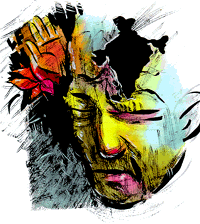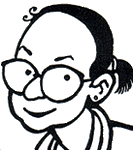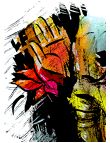India has a strong and well developed body, but her face is darkened with self-doubt

Manjula Padmanabhan
In the community of the world's nations, what
sort of individual is India? I would says, a neurotic adolescent female with past
life delusions. She is the unhappy progeny of a colonial emperor
who coupled recklessly with a harem of traditional cultures. Then
discarded them when their hybrid offspring failed to conform to
the ideals of either parent.
This one, India, has a strong and well developed body, both tall and wide,
but her face is darkened with self-doubt and acne. She's thin but not
because she cannot feed herself. Her lack of self-esteem makes the effort seem
unjustified. Like a victim of anorexia in the real world, she
starves herself wantonly, as an unconscious punishment for her
inability to merge her unique identity with the homogenised melting
pot of the modern world.
While eating disorders have been the crisis which she has been
traditionally associated with, more recently other types of self-abuse
have been included in her repertoire. She is, for instance, heading
for chronic dehydration, her rich forests are thinning out and
her reserves of energy are falling severely short of her requirements.
She has fits of violence and suicidal despair. She is moody and
temperamental.
 In her early years, the one virtue with which she was routinely
characterised was an attitude of tolerance verging on apathy.
Her detractors called it a lack of moral force, while her champions
identified it as a philosophical maturity, the legacy of centuries
of civilisation. But is recent years her detractors seem to have
been vindicated. Like many young people, she has responded to
the confusions and uncertainties of the modern age by turning
away from the path of reason towards superstition and ritual.
In her early years, the one virtue with which she was routinely
characterised was an attitude of tolerance verging on apathy.
Her detractors called it a lack of moral force, while her champions
identified it as a philosophical maturity, the legacy of centuries
of civilisation. But is recent years her detractors seem to have
been vindicated. Like many young people, she has responded to
the confusions and uncertainties of the modern age by turning
away from the path of reason towards superstition and ritual.
Many gods and prophets crowd her altar. Many qualities are represented,
many traditions and orthodoxies. But, increasingly the deity that
presides over all others is the blood-browed spirit of raw Fanaticism.
He is an old god but one whose simplistic formulae are perfectly
suited to the insecurities of today. Rather cleverly, he likes
to use icons borrowed from the Catholic church to fill his alcoves.
Modern India's fundamentalists don't talk about rebirth and fatalism.
Instead, they like to flirt with Christian concepts such as 'salvation'
and 'consecration' and 'heaven' in the sense of
the infinite acres of celestial real estate awaiting the devout
deceased. And why not? The uncertain rewards of a million rebirths
are nothing when compared to the instant gratification offered
by 'World without end, Amen!'
 Like many adolescents, modern India blames one of her parents
for all her failings, in this case, the colonial father. He is
blamed for everything, from the low self-image to the lack of
prestige in the international arena. His names are removed from
city streets and his memory is constantly being dishonoured.
He is accused of having assaulted the chaste and unblemished mother
culture, who, if not for her unfortunate historical encounter
would have sailed into the 20th century with her head held high.
The inheritance of industries, railways, fiscal and legislative
structures are treated with contempt and suspicion.
Like many adolescents, modern India blames one of her parents
for all her failings, in this case, the colonial father. He is
blamed for everything, from the low self-image to the lack of
prestige in the international arena. His names are removed from
city streets and his memory is constantly being dishonoured.
He is accused of having assaulted the chaste and unblemished mother
culture, who, if not for her unfortunate historical encounter
would have sailed into the 20th century with her head held high.
The inheritance of industries, railways, fiscal and legislative
structures are treated with contempt and suspicion.
But India responds like a typically father-fixated daughter to the first
sugar daddy nation who happens to court her with fast food and
soft drinks.
She is unable or unwilling to examine the evidence of the record.
That the mother culture was herself just the latest in a series
of illegitimate daughters caused by successive invaders. That
either there was never any period of perfect chastity or else
that in cultural terms, innocence is a severe liability. It creates
an atmosphere of indifference to the tide of change that is constantly
lapping at the shores of reality. It breeds incompetence and is
an irresistible lure for more vigorous cultures. Particularly
when there are resources to be plundered, weaknesses to be exploited.
The results of the recent election provide a tempting subject
of psychoanalysis. Conveniently, three political entities have
emerged inviting a comparison to the basic Freudian troika of
self. The Congress party represents the superego, the hopeless
idealist, whose vainglorious rantings skew all plan and projections
by raising unattainable goals. The United and Left Fronts represent
the pragmatic ego with its homespun austerities and peculiarly
unappetising tonics for the nation's ills. And the BJP? The BJP
has to be the Id, the source of dark, unspeakable urges, of unexamined
passions, of invisible but potent forces.
In a sense, the pubescent Indian nation has been shown that she
is in the grip of her turbulent Id, unable to face it, unable
to cast it out. Some forms of therapy encourage the patient to
act out her repressed desires. Maybe that's what lies in store
for us in the weeks ahead. We can
only hope that at the end of the exercise, we won't all need electro-shock
treatment and padded cells.
Illustrations: Dominic Xavier
|





 In her early years, the one virtue with which she was routinely
characterised was an attitude of tolerance verging on apathy.
Her detractors called it a lack of moral force, while her champions
identified it as a philosophical maturity, the legacy of centuries
of civilisation. But is recent years her detractors seem to have
been vindicated. Like many young people, she has responded to
the confusions and uncertainties of the modern age by turning
away from the path of reason towards superstition and ritual.
In her early years, the one virtue with which she was routinely
characterised was an attitude of tolerance verging on apathy.
Her detractors called it a lack of moral force, while her champions
identified it as a philosophical maturity, the legacy of centuries
of civilisation. But is recent years her detractors seem to have
been vindicated. Like many young people, she has responded to
the confusions and uncertainties of the modern age by turning
away from the path of reason towards superstition and ritual.
 Like many adolescents, modern India blames one of her parents
for all her failings, in this case, the colonial father. He is
blamed for everything, from the low self-image to the lack of
prestige in the international arena. His names are removed from
city streets and his memory is constantly being dishonoured.
He is accused of having assaulted the chaste and unblemished mother
culture, who, if not for her unfortunate historical encounter
would have sailed into the 20th century with her head held high.
The inheritance of industries, railways, fiscal and legislative
structures are treated with contempt and suspicion.
Like many adolescents, modern India blames one of her parents
for all her failings, in this case, the colonial father. He is
blamed for everything, from the low self-image to the lack of
prestige in the international arena. His names are removed from
city streets and his memory is constantly being dishonoured.
He is accused of having assaulted the chaste and unblemished mother
culture, who, if not for her unfortunate historical encounter
would have sailed into the 20th century with her head held high.
The inheritance of industries, railways, fiscal and legislative
structures are treated with contempt and suspicion.